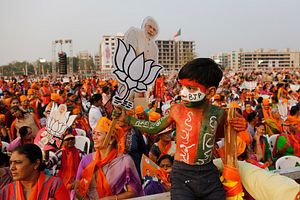India has once again reposed its faith in Narendra Modi despite all the seeming challenges his critics were telling those who cared to listen were facing India. Not only has Modi won a landslide victory in India’s parliamentary elections, but the scale and scope of his victory should force his critics to acknowledge the limitations of their own political imagination. This is as important for his political critics as it is for his intellectual adversaries, who now appear completely cut off from the ground realities in the country. India as a nation has been evolving rapidly — socially, economically, culturally, and demographically – but the national intellectual and political elites have been found wanting. Modi, in contrast, seems to have the pulse of the nation and is more attuned to the underlying shifts. No wonder his biggest vote bank has turned out to be the young first time voter.
In many ways, Modi’s popularity has been there for all to see. In the last five years, Modi’s stature has only grown in the Indian polity. But his critics refused to see it due to their intense dislike for Modi, the person. For them, nothing he did over the last five years merited approval. He was socially regressive, culturally uncouth, economically uneducated and politically polarizing. Contrary to all the evidence, his critics even suggested that his foreign policy brought the stature of India in the global comity down. He was the antithesis of all that the dynasts in Indian politics represented. And worst of all, he could appeal to Indians to rise above caste and regional configurations.
By doing this, Modi’s critics ensured that his personality became the dominant theme of the last five years and this personal targeting was converted into his substantive strength by Modi. The inspirational young Indian has responded to Modi’s story in ways that is quite unprecedented in the annals of Indian polity. And in the process, Modi has expanded the base of the Bharatiya Janata Party (BJP) across regions, communities and demographies. The BJP under Modi is not the traditional cow-belt party of India. It is today the only pan-Indian party which continues to expand. Most of the remaining parties are shrinking and struggling to retain their relevance.
During the elections, the opposition in India gave up fighting on issues long back and their entire strategy was premised on the assumption that at the end of the day all of them would gang up against Modi and prevent him from coming to power. This was their end game, one which collapsed like a pack of cards when confronted with the might of an Indian voter who wants decisive leadership and rapid results.
Modi certainly got some things wrong in the last five years but he got one central aspect of a changing India right: the new age Indian voter is an aspirational one, she wants a confident leadership to represent an increasingly confident and self-assured nation. The youth of today was born in an India which sees the world as its oyster, not one which is out there to sabotage India’s rise. This is what Modi has been able to successfully tap into.
This was reflected in the results which have given Modi a resounding victory, a historic mandate where the same party has been returned to power with growing majorities in two successive elections. What was even more interesting was the defeat of a number of political dynasts, including Rahul Gandhi of the Congress Party who was defeated in his family bastion. Gandhi was supposed to challenge Modi but in the end failed to retain his own family seat. A new India is crafting a new political narrative. These elections have once again proved that while Modi gets this change, his critics are far behind in assessing the implications of this shift.

































